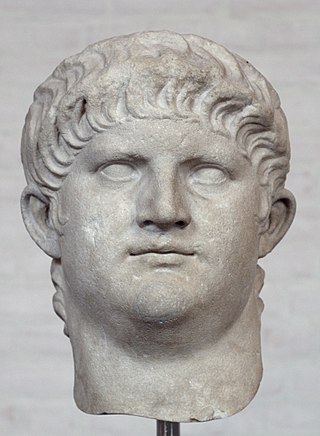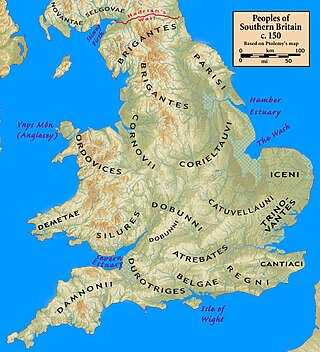
Julia Agrippina, also referred to as Agrippina the Younger, was Roman empress from 49 to 54 AD, the fourth wife and niece of Emperor Claudius, and the mother of Nero.

Boudica or Boudicca was a queen of the ancient British Iceni tribe, who led a failed uprising against the conquering forces of the Roman Empire in AD 60 or 61. She is considered a British national heroine and a symbol of the struggle for justice and independence.

Nero Claudius Caesar Augustus Germanicus was Roman emperor and the final emperor of the Julio-Claudian dynasty, reigning from AD 54 until his death in AD 68.

The 40s decade ran from January 1, AD 40, to December 31, AD 49.

The 60s decade ran from January 1, AD 60, to December 31, AD 69.
AD 44 (XLIV) was a leap year starting on Wednesday of the Julian calendar. At the time, it was known as the Year of the Consulship of Crispus and Taurus. The denomination AD 44 for this year has been used since the early medieval period, when the Anno Domini calendar era became the prevalent method in Europe for naming years.

AD 60 (LX) was a leap year starting on Tuesday of the Julian calendar. At the time, it was known as the Year of the Consulship of Nero and Lentulus. The denomination AD 60 for this year has been used since the early medieval period, when the Anno Domini calendar era became the prevalent method in Europe for naming years.
AD 61 (LXI) was a common year starting on Thursday of the Julian calendar. At the time, it was known as the Year of the Consulship of Turpilianus and Caesennius. The denomination AD 61 for this year has been used since the early medieval period, when the Anno Domini calendar era became the prevalent method in Europe for naming years.

The Roman conquest of Britain was the conquest of part of the island of Britain by occupying Roman forces. It began in earnest in AD 43 under Emperor Claudius, and was largely completed in the southern half of Britain by 87, when the Stanegate was established. Attempts to conquer Scotland (Caledonia) in succeeding centuries met with little sustained success.

Gaius Suetonius Paulinus was a Roman general best known as the commander who defeated the rebellion of Boudica.

The Iceni or Eceni were an ancient tribe of eastern Britain during the Iron Age and early Roman era. Their territory included present-day Norfolk and parts of Suffolk and Cambridgeshire, and bordered the area of the Corieltauvi to the west, and the Catuvellauni and Trinovantes to the south. In the Roman period, their capital was Venta Icenorum at modern-day Caistor St Edmund.

Poppaea Sabina, also known as Ollia, was a Roman empress as the second wife of the Emperor Nero. She had also been wife to the future emperor Otho. The historians of antiquity describe her as a beautiful woman who used intrigues to become empress.
Quintus Petillius Cerialis Caesius Rufus, otherwise known as Quintus Petillius Cerialis, was a Roman general and administrator who served in Britain during Boudica's rebellion and went on to participate in the civil wars after the death of Nero. He later crushed the rebellion of Julius Civilis and returned to Britain as its governor.
Prasutagus was king of a British Celtic tribe called the Iceni, who inhabited roughly what is now Norfolk, in the 1st century AD. He is best known as the husband of Boudica.

The Roman client kingdoms in Britain were native tribes which chose to align themselves with the Roman Empire because they saw it as the best option for self-preservation or for protection from other hostile tribes. Alternatively, the Romans created some client kingdoms when they felt influence without direct rule was desirable. Client kingdoms were ruled by client kings. In Latin these kings were referred to as rex sociusque et amicus, which translates to "king, ally, and friend". The type of relationships between client kingdoms and Rome was reliant on the individual circumstances in each kingdom.
Events from the 1st century in Roman Britain.
This is part of a series on the History of Norfolk

Horrible Histories: The Movie – Rotten Romans is a 2019 British historical comedy film directed by Dominic Brigstocke, based on the book series of the same name by author Terry Deary, and the television series of 2009 and 2015 on CBBC. The film production, of one of the stories, was announced in March 2016. The film is a co-production, between Altitude Film Entertainment, BBC Films and Citrus Films. It was released on 26 July 2019.

The Boudican revolt was an armed uprising by native Celtic Britons against the Roman Empire during the Roman conquest of Britain. It took place circa AD 60–61 in the Roman province of Britain, and was led by Boudica, the Queen of the Iceni tribe. The uprising was motivated by the Romans' failure to honour an agreement they had made with Boudica's husband, Prasutagus, regarding the succession of his kingdom upon his death, and by the brutal mistreatment of Boudica and her daughters by the occupying Romans.
Boudica: The Queen of War, is a British 2023 action drama film directed and written by Jesse V. Johnson. The film follows the eponymous Celtic warrior of the Iceni people, Boudica, in Roman Britain and how she revolted against the Romans after the death of her husband, Prasutagus. The film stars Olga Kurylenko as the titular character. The film received generally negative reviews.














